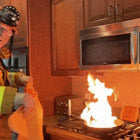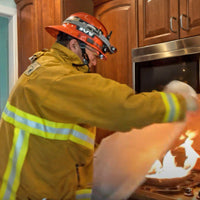Where you put your smoke detectors matters just as much as installing them. Proper placement makes sure they can detect...
A garage is more than just a place to park your car—it adds storage, convenience, and even value to your home. But if you’re considering adding one, you’ll need to decide between an attached or detached garage.
Attached garages are connected to the house, making it easy to access your car or storage without stepping outside. They’re also more budget-friendly since they share walls and utilities with your home. However, they come with security and design challenges.
In this guide, we’ll break down everything you need to know about attached garages—their pros, cons, costs, and whether they’re the right fit for your home.
What Is an Attached Garage?

An attached garage is exactly what it sounds like. It’s a garage that's physically connected to your house. It shares at least one wall with your home and usually has a door that leads directly inside. This setup makes it easy to get to your car, tools, or storage without stepping outside. It makes an attached garage useful, especially when the weather’s bad.
One of the biggest perks of an attached garage is convenience. You don’t have to trudge through rain, snow, or the dark to get to your car. It’s also usually cheaper to build because part of the structure already exists. You’re just adding onto your home instead of starting from scratch. Plus, you can easily use your home’s electricity and heating system for the garage.
However, attached garages have some downsides. Since it’s attached, noise from the garage can carry into your living space. Security can also be an issue. Someone who breaks into the garage can easily get into your home. Safety is another concern because a garage fire can spread more quickly into your house.
Another thing to think about is the lot size. Fitting an attached garage in a narrow lot is tricky. Some homeowners also feel that an attached garage limits design options.
An attached garage is a great option if you want affordability, convenience, and easy access. But if security, design, and extra space are bigger priorities, consider a detached garage instead. Weigh the pros and cons, and choose what works best for your home and lifestyle.
Pros of Attached Garages

An attached garage offers plenty of benefits that make life easier and more convenient. It provides direct access to your home, saves yard space, and can add value to your property. Let’s take a closer look at the pros of attached garages below:
1. Convenience
One of the biggest benefits of an attached garage is convenience. For one, you don’t have to run through the rain or snow to get to your car. You don’t have to get soaked or freeze to start your commute. Plus, your car won’t feel like an oven after sitting in the sun all day during summer.
In addition, an attached garage makes unloading groceries a breeze. You can even put a fridge in the garage for extra storage to make food runs more convenient. Many homeowners also use attic trusses to add storage space for holiday decorations, seasonal gear, or extra furniture.
2. Cost-Effective
Building an attached garage is usually cheaper than a detached one. Since one wall is already part of your house, you’re saving on materials and construction costs. You also don’t need to install separate plumbing, electrical, or heating systems because your home’s existing utilities can extend to the garage.
Another cost-saving perk? An attached garage can help boost your property value. Buyers will see it as an added convenience if you sell your house. Plus, it saves yard space, which is a big win for families with kids or pets.
3. Extra Living and Storage Space
An attached garage doesn’t just give you a place to park. It also expands your home’s functional space. For example, you can move storage items out of the house and into the garage and free up room indoors. Some homeowners even turn part of their attached garage into a laundry area, home gym, or workshop.
An attached garage can also make your house look bigger. For instance, a two-car garage can add a lot of visual weight, so your house looks bigger from the outside.
4. Saves Yard Space
An attached garage also helps maximize outdoor space. You're just extending your house instead of building a separate structure that takes up valuable yard space. This leaves more room for a garden, patio, or play area for kids and pets.
5. Weather Protection
Nobody likes dashing through rain, snow, or freezing temperatures to get into their car. You’re protected from the elements with an attached garage. You can load and unload groceries, get kids into the car, or grab something from your vehicle without stepping outside. It also keeps your car safe from hail, ice, and heavy wind.
6. Energy Efficiency
An attached garage is also more energy efficient. Since it shares a wall with the house, it provides an extra layer of insulation and reduces heat loss in the winter. It also keeps your house cooler in the summer, which lowers your electricity bills.
Cons of Attached Garages

While attached garages offer a lot of benefits, they also come with some drawbacks. If you take proper precautions, an attached garage can still be a great addition to your home. But you must weigh the pros and cons before committing. Here are the cons of attached garages:
1. Security Risks
One big downside of an attached garage is security. It’s connected to your house, so it’s an easy entry point for burglars. If someone gets past your garage door, they have direct access to your home. Plus, electronic garage door openers can sometimes be hacked. The good news? A high-quality garage door, strong locks, and a reliable security system help keep things safe.
2. Fire Hazards and Odors
Garages often contain flammable materials like diesel, gasoline, paint thinners, and propane. If a fire starts in an attached garage, it can spread to the rest of your house much faster than if it were detached.
Aside from fire hazards, garages can also be a source of unpleasant smells. Gasoline, car exhaust, and other chemicals produce strong odors that may seep into your home. Proper ventilation and careful storage of hazardous materials can help reduce these risks.
3. Hard to Expand
Making an attached garage bigger is tricky because it’s connected to your house. Many attached garages are surrounded by walls on three sides, with little to no room for expansion. If you decide to extend it, you might need expensive building permits or face restrictions from local zoning laws. On the other hand, a detached garage is usually easier to modify or expand.
4. Can Affect Your Home’s Look
An attached garage isn’t always the best fit for your home’s exterior. It can look out of place or make your house bulky if not designed well. This is especially true for older homes where a modern garage might clash with the original design. Matching the materials and style of your home can help, but adds to the cost.
5. Takes Up Space
Do you have a narrow lot? Adding an attached garage is hard. Since it’s built into the house, it limits where to place windows or doors. This might make your home feel cramped. In some cases, a detached garage might be a better option because it’s more flexible in terms of space and layout.
6. More Permits
Building an attached garage might require more permits and approvals than a detached one. Some areas have stricter rules for attached structures, which makes the process longer.
Attached Garage Fire Safety Tips

Garages contain flammable stuff—gasoline, paint, propane tanks, and even your car. That makes fire safety a big deal. Some precautions help keep your home and family safe. Here are some fire safety tips you should follow:
1. Store Flammable Items Safely
Keep gasoline, propane, and other flammable liquids in sealed containers and away from heat sources. If possible, store them in a shed instead of your garage. Never leave oily rags lying around because they can catch fire on their own.
2. Keep Your Garage Clean
Dust, clutter, and piles of cardboard can fuel a Class A fire. Keep your garage organized, sweep up dust, and get rid of anything you don’t need.
3. Install a Fire-Resistant Door
The door connecting your garage to your home should be fire-rated and have a self-closing mechanism. This helps slow down a fire if one starts.
4. Use Proper Electrical Outlets
Don’t overload outlets or use extension cords for permanent power. If you need more outlets, have an electrician install them. Remember, faulty wiring leads to devastating electrical fires.
5. Maintain Appliances and Equipment
Do you keep a water heater, furnace, or other appliances in your garage? Make sure they’re maintained well. Keep flammable items far from them, too.
6. Don’t Leave Your Car Running
Never leave your car idle in the garage, even with the door open. Exhaust fumes are dangerous, and hot engines can ignite flammable vapors.
7. Have a Fire Kit Ready
Keep a fire blanket, fire spray, and fire extinguisher in an easy-to-reach spot. Make sure everyone knows where they are and how to use them. Check out how to use a fire blanket and how to use a fire spray here.
What to Consider When Choosing Between an Attached and Detached Garage

Attached and detached garages have pros and cons, so the best choice depends on your needs. Take the time to consider these factors before starting construction:
1. Lot Size
Take a good look at your lot size before choosing a garage type. A garage takes up a lot of space, so you need to think about how much yard you’re willing to give up. Will it block a nice view? Will it leave you with enough outdoor space?
If you’re unsure, grab a tape measure and mark the area where your garage would go. Then, walk around and visualize it. This will help you determine whether an attached or detached garage better suits your property.
2. Your Purpose
Think about why you want a garage in the first place. If you want to avoid walking through bad weather to get to your car, an attached garage is the way to go. If you need a workspace or want to keep noisy projects away from the house, a detached garage is the better choice.
Are you planning to add living space? Both types of garages can be turned into a guesthouse, rental unit, or in-law suite. If the space doesn’t need its own kitchen or bathroom, it’s easier to build it as part of an attached garage. But if you want an independent living space, a detached garage with its own utilities makes more sense.
You should also think about how you’ll heat or cool the space, what kind of storage you’ll need, and how secure your valuables will be.
3. Access
Do you want to walk straight from your house into the garage, or are you okay with stepping outside to get there? An attached garage is more convenient if you live in a cold or rainy climate.
Think about driveway access as well. A garage that’s hard to get to from your driveway isn’t practical. Factor in the added cost if you need to adjust your driveway.
4. Your Home’s Design
A garage should look like it belongs to your house. A brand-new attached garage might not blend well with an older home. But if you’re set on an attached garage, work with your contractor to match the style, roofing, and siding to your existing home.
Plus, consider how your garage will fit in with the rest of your neighborhood. If most homes in your area have attached garages, a detached one might affect resale value. The same goes for the opposite situation.
Is It Cheaper to Build an Attached Garage?

Yes, it is cheaper to build an attached garage. An attached garage is cheaper because it uses part of your house as its structure. That means fewer materials and less labor. Plus, you can get electricity and plumbing from your house.
Another factor is the foundation. A detached garage needs its own, which adds to the cost. On the other hand, builders can use the home’s existing foundation for an attached garage and keep the costs lower.
In the end, an attached garage is more budget-friendly because it shares walls, utilities, and structural support with your home. It’s a cost-effective way to add storage or parking without breaking the bank.
What Defines an Attached Garage?

What defines an attached garage is how it’s placed relative to your house. As the term implies, an attached garage is directly built onto your home. It shares at least one wall with your house. It also has an interior door that connects it to the house, which makes access easy. This setup lets you move between the garage and the house without stepping outside. Since it’s physically connected to your home, it shares utilities like electricity and plumbing. Attached garages are also a common feature in modern homes.
Is It Better to Have an Attached or Detached Garage?

The better option depends on your needs. An attached garage is great if you value convenience. You can go from your car to your house without stepping outside, which is a big plus in bad weather. It also costs less to build since it uses existing walls and utilities.
On the other hand, a detached garage offers more flexibility. It can be placed anywhere on your property and expanded more easily. It also keeps noise, fumes, and fire risks away from your home.
At the end of the day, the best choice depends on your lot size, budget, and how you plan to use the space. Both have pros and cons, but it’s all about what works best for you.
What Is the Difference Between a Built-in and an Attached Garage?

An attached garage is connected to the house that shares at least one wall with it. It’s a separate structure added to the home that gives easy indoor access. On the other hand, a built-in garage is designed as part of the house from the start. It blends into the home’s structure, usually under a second floor or within the main layout.
Both built-in and attached garages are convenient. However, a built-in garage looks more seamless since it’s part of the original design. If you add a garage later, it will be attached.
Conclusion
Choosing between an attached and detached garage comes down to your needs, budget, and space. If you want convenience and savings, an attached garage is a great option. But if security, design flexibility, and extra space matter more, consider building a detached garage. No matter which you choose, proper safety measures and planning help you get the most out of your garage.
Do you want reliable, easy-to-use, and affordable tools to put out garage fires before they spread? Check out Prepared Hero’s fire prevention tools here, and get up to 51% off on certain items. Stay prepared, hero!


 Fire
Fire Safety
Safety Survival
Survival Protection
Protection New
New
 Fire
Fire Safety
Safety Survival
Survival Protection
Protection New
New












